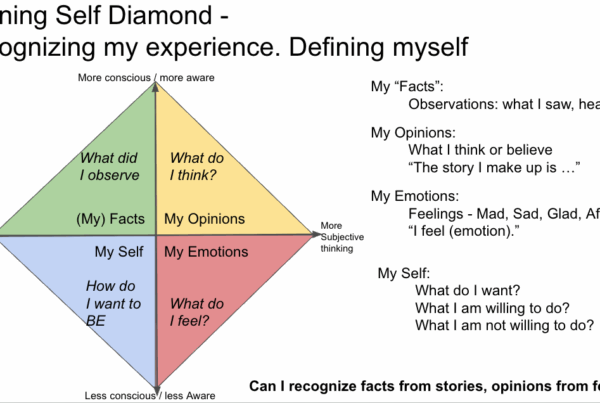
Can defining self help with languishing?
What is languishing and how could defining self help overcome it? A 2021 New York Times article discussed the concept of languishing and suggested that it could be the dominant emotion of 2021. If Bowen Theory is accurate and if languishing is real, then understanding how systems thinking and defining self apply to languishing should be useful.
What is languishing?
Languishing differs from burnout or depression. It can be a feeling of being stuck and unmotivated. A kind of “there’s no point right now” versus “there’s no point at all, ever”. One has goals but can’t seem to get enough motivation to work on them. Languishing comes from having to deal with chronic stressors versus acute stressors. Early in the pandemic, there was heightened anxiety. But there were specific things to watch for and actions one could take to increase one’s safety. As we learned more about COVID-19, the understanding of what to monitor changed. And this has continued for two years. So there has been a changing and ongoing anxious vigilance without a logical end in sight. The drain of responding to this chronic stressor can lead to languishing. Energy is down, motivation is down, focus is down, and a sense of delight is down.
Languishing: low-grade discomfort seeks low-grade comfort.
Low levels of discomfort and motivation can lead to low-grade soothing behaviour. “Doom scrolling”, binge-watching TV, more drinking, and eating more comfort food are soothing behaviours. One important soother of anxiety is social interaction, but during the pandemic that’s been reduced, increasing the need for other soothing behaviours. In addition, the inability to get out has put more pressure on couples and families. Overall, there is a greater pressure to go along in order to prevent conflict and tension at home. There’s the pressure to behave in specific ways to combat the risk of getting and spreading the virus. All this can result in a lot of “giving up of self” in order to avoid the discomfort of the anxiety about getting sick or disapproval from others.
Defining self can help against languishing.
Defining self is getting clear about what one is willing to do and not willing to do in order to be a responsible individual. It shifts one’s focus and energy to self-directed goals and behaviours. It is the thinking that asks “how does this relationship work for me” versus “I need this relationship, what must I give to it”. During the pandemic, there have been more other focus and other-directed goals. Individuals have adapted whether or not they wanted to. This is because of anxiety from real and perceived threats. Individuals tried short-term, anxiety-reducing goals, like soda bread baking, but these don’t work after a while. This is because these were actually other-directed and or soothing type goals versus meaningful self-directed goals. Lowering anxiety is good, but it is not defining self. Systems thinking and defining self provides an individual with a different way to think about stressors.
Defining self understands this is what is.
It asks what do you want to do?
We have a bit of joke phrase in our house that is: “Whhaaat… do yyoooouuu want to do”. Meaning, that just decide and ask for what you want already!
Systems thinking suggests that languishing results from not managing chronic anxiousness and not being self-directed. Languishing is one outcome of a loss of self to others, combined with a chronic level of anxiety. So the antidote to this is to a) not lose self and b) work on managing anxiety. Losing self and defining self occurs in relationships. Managing anxiety is an individual effort, but is often related to relationships and stressors.
Manage Anxiety, Work on Goals, Connect with family
Anxiety affects how objectively one thinks about any situation. Thus, managing one’s anxiety is a great first step. Sleep, exercise and a balanced diet are the base to build on. Junk food and staying up late binge-watching are not! Setting goals for yourself that are important to you, no matter how small, is important. Do something that you want to do. This includes your goals for managing anxiety, which could include sleep hygiene, more exercise, meditation, and changes in diet.
Family members can be a great resource. Social interaction can be a great antidote to anxiety. More brains can help one think more clearly about an issue. How are other family members, parents, siblings, uncles, aunts, nieces, nephews, and cousins doing? What are they doing to not let the pandemic sidetrack their whole life? An open conversation about this can be very helpful. Any person who you can have meaningful conversations with is an important resource – use them.
Languishing doesn’t happen overnight. Defining self takes time.
Start with smaller, very achievable goals and some level of increased contact with family and friends. Something that you have some level of motivation to achieve. At the same time, work to say no to the things you feel pressured to go along with, but that you really don’t want to. Talk to friends and family about what might work for them. For example, there may be pressure to “get back to normal” and you might not be ready yet because of considerations for your health. Work to stick to what you believe is best for you. Goals for well-being are always good to have, but they should work for you and your situation. These shifts can take time. Consistency is very important – small achievements, consistently over time, really add up.
Thinking systems and defining self to overcome languishing
A systems understanding of languishing provides a way to think about both avoiding it and overcoming it. A systems perspective would say that a chronic state of anxiety, loss of self, and blocking of goal-directed behaviour will lead to languishing in any area. Personal relationships and work can be a source of languishing anytime. It doesn’t need a pandemic. A systems perspective would also say that managing anxiety, defining self better and having the conviction to pursue self-directed goals are how to mitigate languishing. It’s not always easy, but these kinds of shifts change the trajectory from negative to positive and over time, that makes all the difference.
(Please seek professional help if you feel you are suffering from languishing or depression. It is not the intention to provide medical advice with this post.)
Dave Galloway
dave.galloway@livingsystems.ca
You can find the New York Times article here: https://www.nytimes.com/2021/04/19/well/mind/covid-mental-health-languishing.html.
A search on the term languishing will provide other resources.
You can find a video on defining self here: https://www.youtube.com/watch?v=R9KKlPNEBkY.
Read more about differentiation here: https://www.thebowencenter.org/differentiation-of-self.
Don’t miss any posts. [wpforms id=”3826″]


